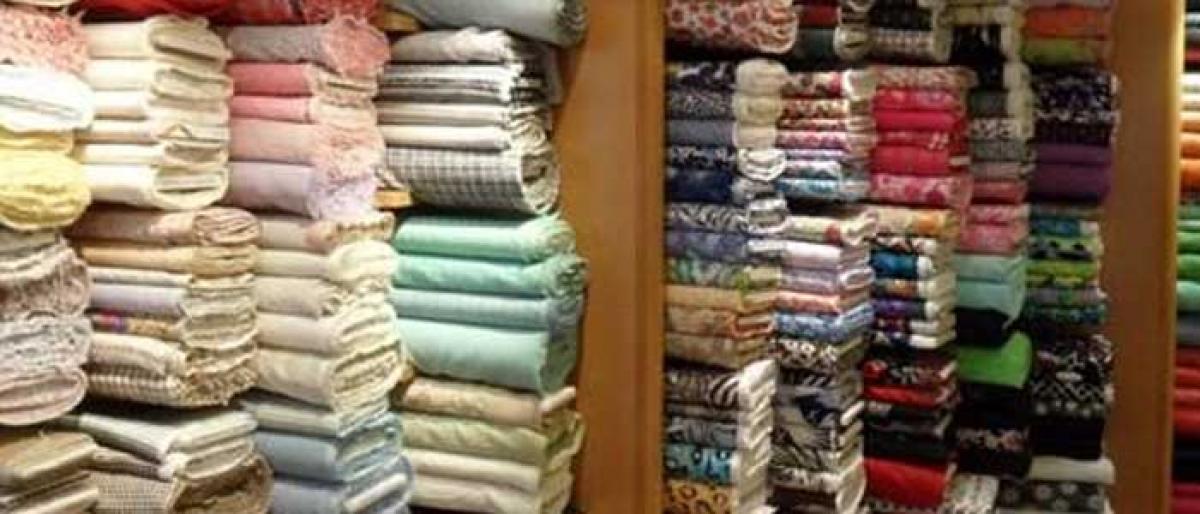Live
- Vijayawada: YSRCP leaders complain to EC on Balarkrishna, Lokesh
- Vijayawada: CFD mulls revival of Election Watch
- Mangalagiri: TDP-NRIs vow to bring back Naidu as CM
- Lok Sabha Polls 2024: Campaigning ends for Phase 1
- Visakhapatnam: Dalit forum demands removal of Thrimurtulu from poll fray
- Gaiety, devotion mark Ram Navami as city turns saffron
- Musk to invest $3 bn in India
- Sudden deluge drowns Dubai
- Grandeur marks celestial wedding in Bhadrachalam
- Revanth vs Modi: Congress braces up for Modi blitzkrieg
Just In

It’s been a quarter since GST came into force, but the new indirect tax has already caused considerable damage to the textile trade in both the Telugu states with traders facing acute credit crunch and drastic fall in margins owing to abnormal increase in credit cycles.
Hyderabad: It’s been a quarter since GST came into force, but the new indirect tax has already caused considerable damage to the textile trade in both the Telugu states with traders facing acute credit crunch and drastic fall in margins owing to abnormal increase in credit cycles.
Post the GST implementation, consumers are also coughing up 8 per cent more as textiles attract 5 per cent tax now and there is significant administration cost involved in filing returns. “With GST adversely disrupting trade credit cycle, the net margins in the textile business have drastically slipped below the tax rate i.e. 5 per cent.
Textile traders particularly wholesalers in both the Telugu states are reeling under severe credit crunch as GST has been impacting their cash flows,” Ammanabolu Prakash, president, Telangana State Federation of Textile Associations (TSFTA), told The Hans India.
The industry body represents over 30,000 merchants in 31 districts of Telangana. Prakash said situation was no different in Andhra Pradesh.
According to industry insiders, the credit cycle of textile wholesalers, who operate on razor-thin margins, has already gone up to six months from the usual 90 day-period thanks the twin blows of demonetisation and GST. “Textiles business runs on wafer-thin margins and is mostly credit-based. Demonetisation has crippled our business.
Now, paying tax every month, including three returns is squeezing traders post the implementation of GST. There was no tax on fabric until GST came into force. But unfortunately, the Centre imposed tax on this business despite strong protests. We are not facing innumerable problems, including drastic fall in margins,” a wholesaler at General Bazar in Secunderabad lamented. He was not willing to be quoted fearing tax authorities.
Technical glitches of GSTN portal which is used for filing returns are compounding their woes. Added to it, they have to raise an e-way bill number for transactions valued over Rs 50,000. Many traders complained that this process was time-consuming. “Under GST regime, if a trader is ferrying goods worth of over Rs 50,000 within or outside state, he will have to secure an e-way bill by prior online registration of the consignment.
To generate an e-way bill, the seller and transporter with details of purchaser will have to upload details on the GSTN portal. Then only EBN will be available to the supplier, the recipient and the transporter on the common portal. Why EBN is required, when seller and buyer both are registered with GST.
Moreover, the Rs 50,000 threshold is very less for volume-based textile business. We want the government to raise this bar,” said another wholesaler. Textile merchants, nearly 40 per cent of them are under GST fold, want scrapping e-way bill as raising e-way bill number (EBN) is time-consuming process and redundant.

© 2024 Hyderabad Media House Limited/The Hans India. All rights reserved. Powered by hocalwire.com







